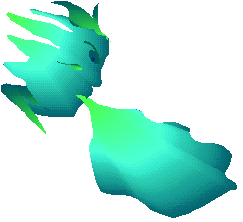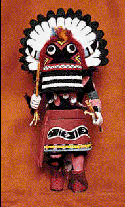 |
Hopi: Yaponcha - The Wind God |
 |
Hopi: Yaponcha - The Wind God |
Long, long ago, the Hopis were greatly troubled by the wind.
It blew and blew and blew and blew--all the time. The Hopis planted their crops,
but before the seeds could begin to sprout, the wind blew the soil and seeds
away. Unhappy and worried, all the people made prayer offerings of many kinds.
But they accomplished nothing.
The old men held councils in their kivas. They smoked their pipes prayerfully and asked one another, "Why do the gods turn such strong winds upon us?" After a while, they decided to ask for help from the "Little Fellows" who were the two little War Gods, two of the five grandsons of Spider Woman.
"Why did you ask us to come?" was their first question.
"We need your help," answered the old men. "Something must be done to the Wind."
"We will see what we can do for you," said the Little Fellows. "You stay here and make many more prayer offerings."
The Hopis make many kinds of prayer offerings--as many as there are prayers, and there are prayers for every occasion in life and death. They are reverently fashioned of various types of feathers, carved and painted sticks, and hand-spun cotton yarn.
The Little Fellows went first to their wise old grandmother, Spider Woman. They asked her to make some sweet cornmeal mush for them to take along on a journey. Of course they knew who the Wind God was and knew that he lived over near Sunset Mountain in the big crack of the black rock.
When Spider Woman had the cornmeal mush ready, the Little Fellows came back to the kiva where the men were holding their council. The prayer offerings were ready and also the ball that the Little Fellows like to take with them wherever they went. They liked to play catch with it.
The men made bows and arrows for them to take on their journey which seemed much like going on a war party. The arrows were tipped with bluebird feathers, thought to be more powerful than any other kinds of feathers.
The two Little Fellows started toward the San Francisco Peaks. The old men went along until they reached the Little Colorado River, and there they sat down and smoked their pipes. The smoking of tobacco among the Hopis, as among many other tribes, is strictly ceremonial. The sacred smoke carried the prayers of the Hopis to their Gods.
Continuing their journey, the two Little Fellows played catch- ball from time to time. On the fourth day they reached the home of the Wind God who lived at the foot of Sunset Crater, in a big crack in the black rock. There he breathed through the crack, as he does to this day. The Little Fellows threw the prayer offerings into the crack and hastily put their old grandmother's sticky cornmeal mush into and over the crack, and thus sealed the Wind God's door. Phew--he became very angry, so angry that he blew and blew and blew, but could not get out. The Little Fellows laughed and laughed and then went home, feeling very proud of themselves and of what they had done.
But after a while, the people in the villages began to feel very hot. Every day the weather became hotter and hotter. People came out of their homes and stood on housetops to look toward the San Francisco Peaks, to see if any clouds were coming their way. But they did not see even a wisp of a cloud, and they seemed not to feel a breath of air. They thought they would suffocate.
"We must do something right away," everyone said or thought. So the men made some more prayer offerings and called the two Little Fellows again. "Please go back to the House of the Wind God at once and tell him that there must be peace between us. Then give him these prayer offerings and let him out. This heat is much worse than the wind."
The Little Fellows replied, "We will go and see what we can do with the Wind God to make life more comfortable for you."
After four days, they arrived at the House of Yaponcha--the House of the Wind God. The Little Fellows decided that the wisest thing to do would be to let the Wind God have a small hole open--just enough to let him breathe through but not enough for him to come out of the crack in the black rock.
So they took a little of the cornmeal mush out of the crack. Immediately, a nice cool breeze came out and a small white cloud appeared. It floated over across the desert toward the Hopi villages.
When the Little Fellows reached home, everyone was pleased. The Hopis have been grateful to the Little Fellows ever since. The winds have been perfect--just strong enough to keep the people happy but not strong enough to blow everything away.
Every since then, every year in the windy month of March, the chiefs and the high priests of the three villages on the Second Mesa give prayer offerings to the Wind God, Yaponcha.
 Hopi Kachina |
| A NATIVE AMERICAN INDIAN FACTOID: The Hopi, descendants of the prehistoric ANASAZI people, are a Pueblo Indian tribe of the southwestern United States. Their population, (under 10,000 in 1988) is concentrated in villages on or below Three Mesas in Northeastern Arizona. In an attempt to avoid invasion by neighboring tribes, the Hopi located their villages in more remote areas that could be reached only by steep trails ascending through breaks in the cliffs. The Hopi speak a Shoshonean dialect of the Uto-Aztecan linguistic family. Hapitu or Hopi meaning the "peaceful ones" were the only Shoshones to adopt a pueblo culture. Hopi culture is regarded as one of the best-preserved native American cultures in North America. A sedentary farming people, the Hopi have an elaborate and all-pervasive religious system which has been their answer to insecurity in a difficult environment, and throughout the year one ceremonial follows another in rapid succession. Among those intended to bring rain and fertility are the colorful snake dance and KACHINA pageants. |
Yaponcha Illustration Courtesy of Linda Hastings from her tale, Water, Wind & Fire.
Stories
and Illustrations found on this site are exclusive to Bedtime-Story
Reproduction
of any content without the express
written permission of Bedtime-Story is prohibited.